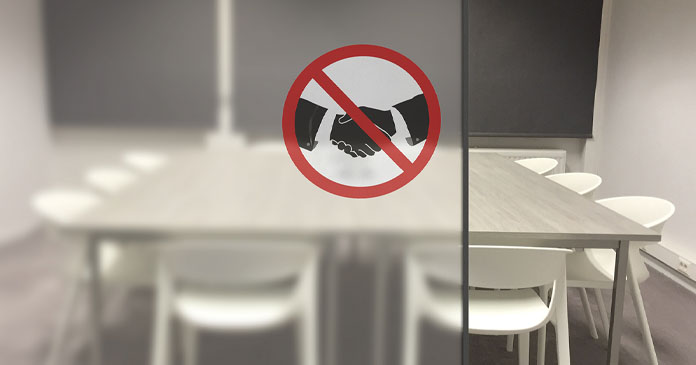Last week I flew to a conference in Kentucky. After reading all of the precautions about traveling, I dutifully wiped down my airplane seat and tray table and packed extra hand sanitizer.
But when I got to the conference the following morning, I found myself in an awkward situation. Many of the people I met, after introducing themselves, put out their hand for a hand shake.
The first few times it happened, afraid of offending anyone, I shook their hand (and then beelined for the hand-sanitizer station). But after a while I got more comfortable declining the offer—sometimes verbally and sometimes in more subtle ways. And given how rapidly the Covid-19 situation is evolving, I’m glad I did.
Over the next few weeks and months, if you find yourself meeting new people or even reuniting with work colleagues or clients you haven’t seen for a while, how can you navigate this potentially awkward situation? Here are a few things to keep in mind.
Accept the awkwardness
While greetings are typically small gestures, they can carry a lot of weight. When someone makes an overture, and you choose to reject that offer, you’re violating social norms, says Andy Molinsky, a professor at Brandeis and the author of Global Dexterity: How to Adapt Your Behavior Across Cultures without Losing Yourself in the Process. “
Transgressions of professional norms like these can feel awkward because your actions break the routine and script of how you tend to express warm greeting,” he says. Also, it’s a “micro-refusal,” which can be uncomfortable and risky. You may worry that you’re making a bad impression or sending an unfriendly message.
This can be even more challenging in cultures where there is high-power distance and people are expected to defer to the higher status person as to how they prefer to greet. This may result in an awkward dance where you try to figure out what you both feel comfortable with—a fist bump? Touching elbows? Feet? Just a wave or a bow?—and who should follow whose lead.
What’s comfortable?
Before you go into a meeting or you greet someone new, think through what you want to do. Having a plan will give you confidence and potentially make it less awkward. At the conference last week, I got used to keeping my hand in my pocket and saying, with a smile on my face, “I guess we’re not supposed to shake hands now.”
That phrasing helped to reframe what might’ve been perceived as a refusal into a shared acknowledgment of the current situation. Having done it once, I felt more comfortable repeating it throughout the day.
Maggie Stieg, a senior facilitator with The Ariel Group, an organization that provides leadership and presence training, shared a lesson she learned from teaching workshops in the United Arab Emirates with Emrati and expatriates.
The program included a hand-shaking exercise. “We explored the ways Emirati women let others know they did not shake hands. One of the methods that worked best was simply to place the right hand on the chest (as in the posture of pledging allegiance to the flag). No words seemed necessary with that posture,” she explained.
Molinsky said he’s been observing people saying hello at a slightly farther distance and giving a quick wave before returning their hand to their pocket. He’s tried it out a few times himself and says it’s a way to “nonverbally signal that we’re going to forego the normal ritual.”
Use humor to defuse the discomfort
Since you are violating a norm, it can be helpful to make light of the situation. On the plane ride home from my conference, the man sitting next to me and I pulled out our sanitizing wipes at the exact same time, accidentally bumping elbows. He said “This is what we do now,” which was just enough to make us both laugh—and to feel like we were in it together.
Of course, humor should never come at the expense of anyone or any group, but as long as it’s lighthearted and intended to connect, it’s a nice way to acknowledge that we’re all behaving differently these days.
Avoid judgement
Given the current circumstances, you probably don’t need to apologize for your unwillingness to shake hands though you could if you feel inclined.
One of the reasons that this is potentially awkward is that declining to shake someone’s hand could carry judgement—as in, “I’m doing a better job taking care of myself” or “Are you really such a germaphobe?”
Instead of worrying about how your behavior measures up against another, recognize that we’re all on a continuum of risk and uncertainty, says Molinsky.
Some people feel more comfortable with a handshake and others prefer an elbow bump while others want to avoid contact altogether.
And there are likely reasons you don’t know—or need to know—that inform their choices, like an underlying health issue or a cultural background. Molinsky says to remind yourself in these moments that “there’s no judgement; we’re just on different ends of a spectrum.”
Reserving judgment and not worrying what others think of you is good advice at all times, and especially important now when stress and anxiety are heightened. Do what you feel comfortable doing, and assume others will understand.
Excerpt Amy Gallo, hbr.org













